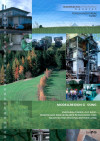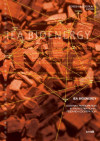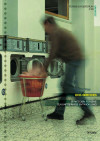Suchergebnisse
Ecodesign

Initiativen und Maßnahmen zur Förderung einer umweltgerechten Produktgestaltung
Forschungsforum
2/1995
Herausgeber: BMVIT
Deutsch, 6 Seiten
Downloads zur Publikation
Development of a Cost-Benefit-Tool: costs and benefits of energy efficient and ecologic buildings
Development of a cost-benefit-tool which reaches beyond a pure cost approach and also recognizes the benefits of a building for its inhabitants and users. The inclusion of benefits is based on existing evaluation systems, especially on the Austrian building evaluation system TQB - Total Quality Building, which has been revised in 2009.
Delphi Report Austria

Zukunftsorientierte Ansätze zur langfristigen Konkurrenzfähigkeit und Standortqualität Österreichs
Forschungsforum
4/1998
Herausgeber: BMVIT
Deutsch, 6 Seiten
Downloads zur Publikation
Berichte aus Energie- und Umweltforschung 3/2002 Beschäftigung und Erneuerbare Energieträger

Erarbeitung eines methodischen Leitfadens zur Abschätzung der Beschäftigungseffekte im Bereich der erneuerbaren Energieträger
Internationale Leitlinie Umweltkostenrechnung

In Zusammenarbeit mit der International Federation of Accountants (IFAC)
Modellregion Güssing

Energieautarkie auf Basis regionaler erneuerbarer Ressourcen und nachhaltige Regionalentwicklung
Forschungsforum
1/2007
Herausgeber: BMVIT
Deutsch, 6 Seiten
Downloads zur Publikation
Ecological and Social Efficiency Index - EASEY X
Basing on a model and indicators for valuing sustainability of companies quoted at the prime market of the Vienna stock exchange methods and instruments have been developed to analyse their performance. By the connecting step company data have been collected and analysed by four different methods (SPSS, EVA, SVA, MCA Outranking). On a 100 scores scale five companies exceeded barely the mark 70, 6 rank between 60 and 69 further 5 between 52 and 59. The aim is to launch a sustainability EASEY index 2004 or beginning 2005.
Multifunktionale Energieversorgung in Städten
Technologieportfolio und Aktionsplan für die Integration nachhaltiger Energieträger in der Fernwärmeproduktion von Städten und zur Steigerung der Gesamteffizienz der Fernwärmeversorgung vom Energieeinsatz bis zur Energiedienstleistung.
"IÖB-Tool" Housing and renewable energy technologies
Innovation-promoting public procurement tool for housing and renewable energy technologies
Fair market conditions for virtual power plants
Analysis of technical, economical and regulatory conditions to get fair terms under competition in the liberalised market for virtual power plants on renewable energy basis.
Berichte aus Energie- und Umweltforschung 15/1996 Öko-Audit Evaluierung der ITF-Pilotförderung

Studie über Erfahrungen bei der Einführung von Umweltmanagementsystemen in Betrieben
Berichte aus Energie- und Umweltforschung 8/1998 Innovationen für eine nachhaltige Entwicklung

Beitrag für die Ausrichtung eines Technologieschwerpunktes "Nachhaltig Wirtschaften"
Berichte aus Energie- und Umweltforschung 1/1996 Wege zum Autofreien Tourismus

Planungshandbuch
Berichte aus Energie- und Umweltforschung 13/2000 Ökologische Dienstleistungen - Markt der Zukunft

Urban Future - "Resource Efficient City of Tomorrow"
Challenges fort he cities of tomorrow with research issues referring to resource management, efficiency and technology development
IEA Bioenergy

Austrian Participation in an international Research Cooperation
Forschungsforum
4/2000
Herausgeber: BMVIT
Englisch, 6 Seiten
Downloads zur Publikation
Energetische Sanierung in Schutzzonen

Standardisierte Lösungen als Hilfe und Richtlinie für Bauherren, Behörden und Firmen
Eco-Services

Strategien für eine zukunfsfähige Entwicklung
Forschungsforum
4/1999
Herausgeber: BMVIT
Deutsch, 6 Seiten
Downloads zur Publikation
Natural Dyes for the Textile Industry
New cooperations between agriculture und industry are necessary to ensure the utilization of renewable materials. The project´s focus is upon natural dyes and their application in textile industry. The goal of the project is to create a contact institution which connects various suppliers of diverse plant materials, takes on the processing, and standardising of the natural dyes, and makes a product that can be used by the industry.
Smart Rebound - Steigerung der Energie- und Ressourceneffizienz durch Rebound-Prävention bei Smart Cities
Erarbeitung von Grundlagen zur stärkeren Verbindung von technologischer und gesellschaftlicher Entwicklung, sodass sie in das Smart-Cities-Konzept integriert werden können. Empfehlungen für die Technologieentwicklung und Technologiepolitik für eine bewusste und zielgerichtete Gestaltung des gesellschaftlichen Umgangs mit effizienzsteigernden neuen Technologien.
